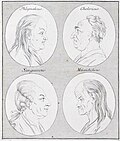The six-factor model of psychological well-being is a theory developed by Carol Ryff that determines six factors that contribute to an individual's psychological...
18 KB (2,078 words) - 07:51, 10 June 2024
positive evaluation of one's life as a whole. Psychologist Carol Ryff (1950–present) proposed the six-factor model of psychological well-being. It states that...
133 KB (14,075 words) - 16:45, 11 May 2025
Carol Ryff (category University of Wisconsin–Madison faculty)
she directs the Institute on Aging. Ryff developed the six-factor model of psychological well-being. "Olivia Metzger, Alexander Dennis". The New York Times...
4 KB (152 words) - 07:59, 17 November 2023
theories are Diener's tripartite model of subjective well-being, Ryff's Six-factor Model of Psychological Well-being, Corey Keyes' work on flourishing...
261 KB (30,434 words) - 11:49, 29 May 2025
Big Five personality traits (redirect from Five factor model of personality)
five-factor model (FFM) is a widely-used scientific model for describing how personality traits differ across people using five distinct factors: openness...
195 KB (20,265 words) - 12:55, 3 June 2025
The HEXACO model of personality structure is a six-dimensional model of human personality that was created by Michael C. Ashton and Kibeom Lee and explained...
40 KB (4,841 words) - 15:53, 23 May 2025
scale that could assess euthymia: the six-factor model of psychological well-being. The 84-item scale includes facets of self-acceptance, positive relations...
8 KB (1,000 words) - 08:15, 10 March 2025
modification of the Guttman rule for determining the number of factors in an exploratory factor analysis". Psychological Test and Assessment Modeling. 56: 104–123...
72 KB (10,024 words) - 16:28, 25 May 2025
promote well-being or protect them against the overwhelming influence of relative risk. This research supports the model in which psychological resilience...
135 KB (15,795 words) - 22:36, 22 May 2025
Positive psychology (redirect from Psychology of happiness)
feels about his or her life is important." Carol Ryff's six-factor model of psychological well-being was first published in 1989. It postulates that self-acceptance...
121 KB (13,455 words) - 22:37, 22 May 2025
Eudaimonia (category Well-being)
(hierarchy of needs). Theories include Diener's tripartite model of subjective well-being, Ryff's Six-factor Model of Psychological Well-being, Keyes work...
44 KB (6,118 words) - 06:14, 25 May 2025
Manipulation (psychology) (redirect from Psychological control)
subscale on the HEXACO model of personality, the Agreeableness factor in the Big Five personality test, and on certain factors of the MMPI. Manipulative...
35 KB (3,707 words) - 00:29, 2 June 2025
The honesty-humility factor is one of the six basic personality traits of the HEXACO model of personality. Honesty-humility is a basic personality trait...
14 KB (1,814 words) - 19:42, 28 February 2025
Psychology (redirect from Psychological)
study of factors which contribute to human happiness and well-being, focusing more on people who are currently healthy. In 2010, Clinical Psychological Review...
238 KB (26,634 words) - 06:04, 2 June 2025
the Five-Factor model of personality disorders. Empirical support for this approach comes from factor analyses that include the Big Five factors and evaluative...
45 KB (5,345 words) - 23:17, 3 June 2025
Conscientiousness (section Subjective well-being)
one of the five traits of both the Five Factor Model and the HEXACO model of personality and is an aspect of what has traditionally been referred to as...
42 KB (4,665 words) - 18:56, 23 May 2025
Openness to experience (category Psychological concepts)
to experience is one of the domains which are used to describe human personality in the Five Factor Model. Openness involves six facets, or dimensions:...
51 KB (5,378 words) - 23:28, 23 May 2025
Flourishing (category Well-being)
Fredrickson. Keyes collaborated with Carol Ryff in testing her Six-factor Model of Psychological Well-being, and in 2002 published his theoretical considerations...
62 KB (8,336 words) - 05:43, 2 June 2025
engender an environment of pervasive surveillance and mistrust, undermining psychological safety and well-being. Perpetuation of Bias and Discrimination...
77 KB (9,096 words) - 04:35, 23 April 2025
Personality Inventory Manual. Odessa, FL: Psychological Assessment Resources. Boyle, G.J. (2008). Critique of Five-Factor Model (FFM). In G.J. Boyle, G. Matthews...
59 KB (7,423 words) - 18:14, 23 May 2025
happiness Reasonable person model (RPM) Well-being contributing factors Diener, Ed (1984). "Subjective well-being". Psychological Bulletin. 95 (3): 542–575...
88 KB (10,671 words) - 14:58, 22 May 2025
Self-compassion (section Six-factor model)
study could not replicate the six-factor structure of Neff's Self-Compassion Scale, but rather suggested a two-factor model of the scale, created by grouping...
57 KB (6,807 words) - 09:12, 28 May 2025
several other domains. A common reason for a psychological evaluation is to identify psychological factors that may be inhibiting a person's ability to...
46 KB (5,861 words) - 14:48, 25 May 2025
Breakup (redirect from Breakdown of marriage)
qualities of their parents, they will fear separation and break-ups. Several psychological models have been proposed to explain the process of a relationship...
35 KB (4,393 words) - 22:14, 3 June 2025
Revised NEO Personality Inventory (redirect from NEO-Five Factor Inventory)
Inventory and development of a 120-item IPIP-based measure of the five-factor model". Psychological Assessment. 26 (4): 1070–84. doi:10.1037/pas0000004. PMID 24932643...
36 KB (4,313 words) - 18:06, 25 May 2025
as a psychological concept, because the model suggests that g factors derived from different test batteries simply reflect the shared elements of the particular...
125 KB (15,459 words) - 04:10, 2 June 2025
pre-surgery psychological assessment. There is empirical support for Five Factor Model traits – to which AMPD criterion B traits are related – being useful...
34 KB (3,802 words) - 06:37, 23 May 2025
Facet (psychology) (section Five factor model)
Each of the Big Five personality traits in the five factor model contains six facets, each of which is measured with a separate scale. The use of facets...
21 KB (1,680 words) - 17:57, 16 January 2025
16PF Questionnaire (redirect from Cattell personality factor questionnaire)
factors. The measurement of normal personality trait constructs is an integral part of Cattell's comprehensive theory of intrapersonal psychological variables...
56 KB (6,604 words) - 05:12, 23 May 2025
Job characteristic theory (redirect from Job characteristics model)
meaningfulness in a job that substantially improves either psychological or physical well-being of others than a job that has limited effect on anyone else...
33 KB (4,262 words) - 10:37, 25 February 2025






